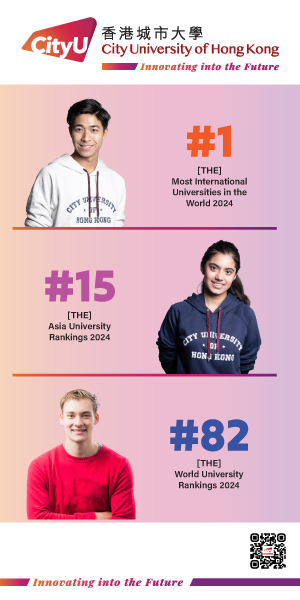In view of the complex interactions and interdependencies of animal and human populations with each other and the environment, CityU is promoting the One Health approach to safeguarding public health. Under this overarching theme, CityU aims to develop and integrate interdisciplinary, problem-based research collaborations and communications in all aspects of health-related issues.

First internationally recognised veterinary school in the region
With the establishment of the Jockey Club College of Veterinary Medicine and Life Sciences (JCC), CityU aims to pioneer excellence in veterinary research and education locally, regionally and globally, spotlighting public health, food safety, animal welfare and aquatic animal health for the well-being of society.
CityU, in collaboration with Cornell University, offers the first six-year Bachelor of Veterinary Medicine programme in Asia designed to meet strenuous international accreditation standards.
The research, teaching and outreach activities at JCC will advance the development of veterinary and human medicine and will focus on research excellence to understand the fundamental processes that underlie health and disease. Our overall goal is to improve the quality of life and the health of humans, animals and the environment under the One Health paradigm, and to ensure sustainable food production by upholding animal welfare.
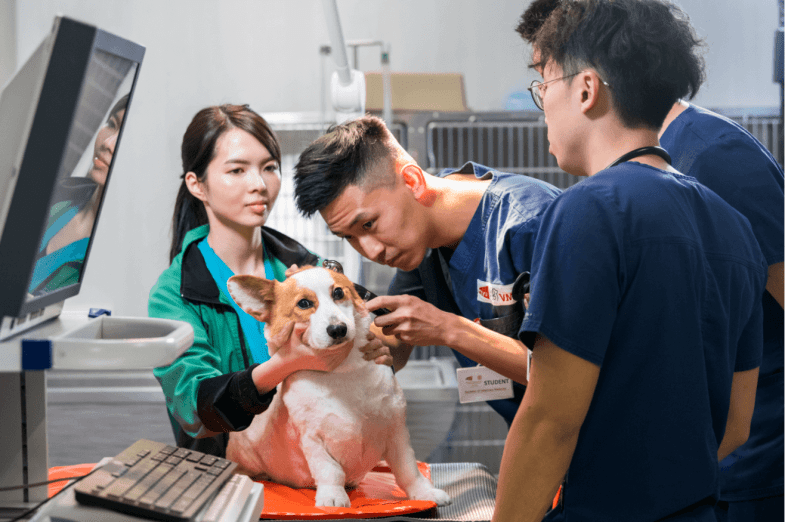
In addition, the CityU Veterinary Medical Centre, one of the largest veterinary clinics in Southeast Asia, has been established. It provides medical cases for studies and practicum opportunities for JCC students. In addition to its primary veterinary services, the Centre has the largest specialist veterinary team in Hong Kong.
One Health approach to future pandemics
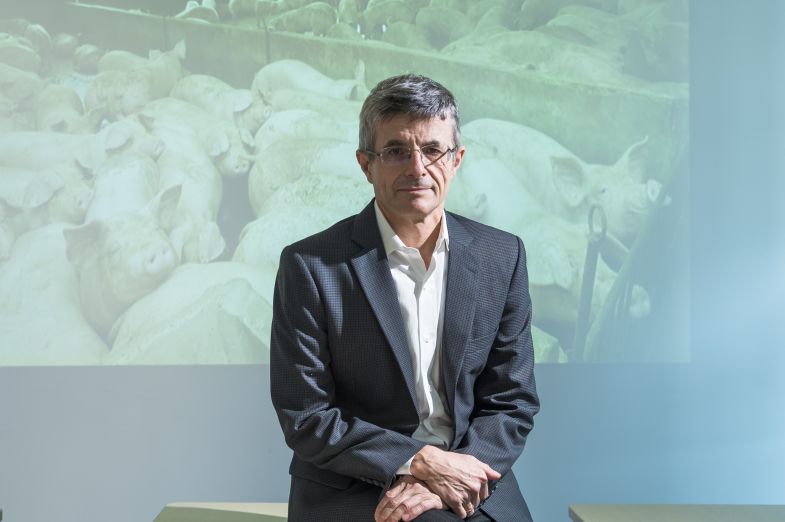
Professor Dirk Pfeiffer
While the world is still battling the Covid-19 pandemic, Professor Dirk Pfeiffer, Chow Tak Fung Chair Professor of One Health and Director of the Centre for Applied One Health Research and Policy Advice (OHRP), stressed that the One Health approach can better manage, and ideally prevent, future pandemics. Such an approach will enable us to deal more effectively with other global human, animal and environmental health issues.
“One Health is not just about medics working together with vets and virologists. It needs to be based on a truly interdisciplinary approach to research, policy development and the social sciences. There are many ways to control a pandemic, but a key driver is human behaviour,” said Professor Pfeiffer. Through JCC and OHRP, CityU can contribute by improving our understanding of what the drivers of emerging infectious disease are, and recommending interventions using the One Health approach.
Another pressing issue that can be addressed through One Health is antimicrobial resistance (AMR). The World Health Organisation declares AMR to be one of the top 10 public health threats facing humanity. With support from the Sustainable Agricultural Development Fund, two research projects led by Professor Pfeiffer are helping pig and poultry farmers reduce the use of antimicrobial drugs by enhancing their understanding of AMR.
Health technology ecosystem tackles cardiovascular diseases
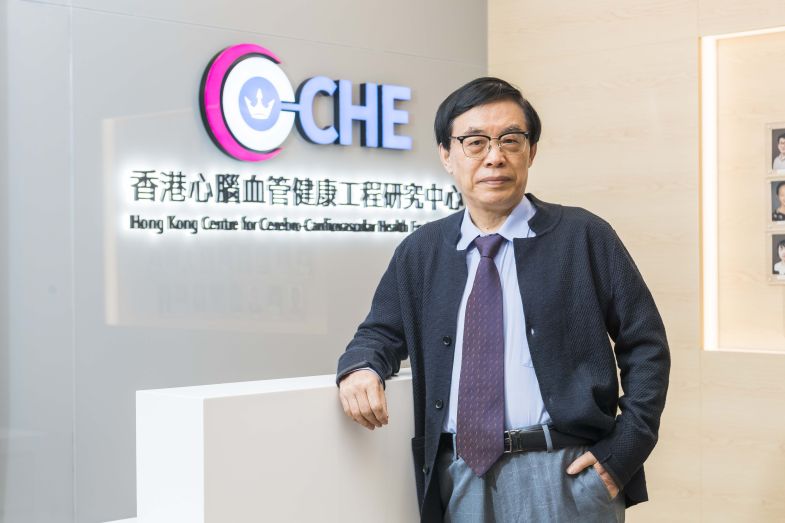
Professor Zhang Yuanting
Cardiovascular disease (CVD) is the world’s leading killer. To address this health challenge, a health engineering team led by Professor Zhang Yuanting, Chair Professor of Biomedical Engineering, is developing groundbreaking technologies, from wearable sensing devices to AI-based early diagnostic and monitoring systems. His long-term goal is to establish an innovative health technology system for effective disease prevention and therapy.
Together with collaborators from top universities and research institutes, Professor Zhang and his team are working on studies that address major gaps in early diagnosis and condition management of CVDs.
In particular, they are focusing on the development of wearable soft sensing devices made of flexible materials together with a system that can monitor cardiovascular conditions and associated risks based on physiological models. These affordable biomedical devices under development are highly sensitive to CVD-related biomarkers. “These wearable devices can help us identify CVD risks as early as possible,” he said.
Microfluidic technology accelerating screening of anti-cancer drugs
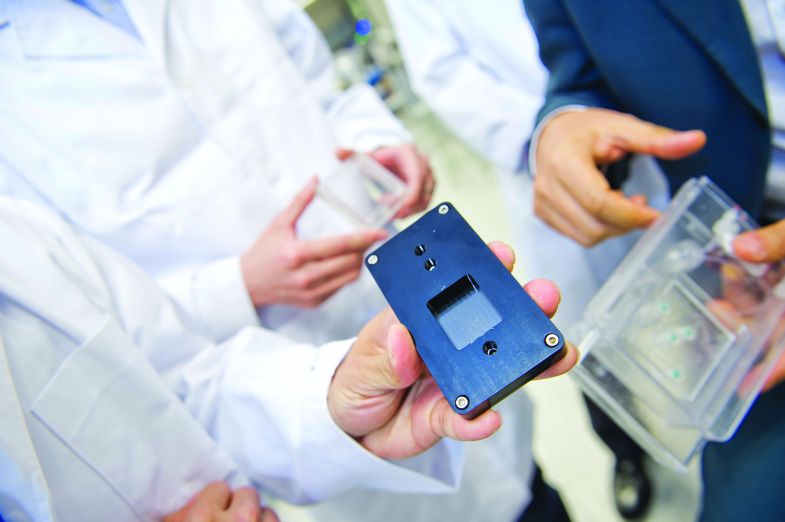
Professor Michael Yang Mengsu, Yeung Kin Man Chair Professor of Biomedical Sciences and Vice-President (Research and Technology), is leading a high impact research project on a microfluidic-based technology platform for the efficient screening of potential drugs. The platform is based on Professor Yang’s internationally recognised, award-winning biochip technology.
Currently, two commonly used drug-screening technologies are available: high-throughput screening (HTS) and high-content screening (HCS). Combining the strengths of both, the research team led by Professor Yang is developing an integrated microfluidics platform that can mimic the physiological and pathological microenvironments for cell-based assays. This approach will facilitate the simulation of in-vivo conditions of cell growth, communication and migration for high-throughput, high-content screening of drugs that can target cell-to-cell interactions.
The specially designed microfluidic chip enables a tumour cell and spheroid arrays to be formed for screening anti-cancer drugs with various concentration gradients and combinations. It can test the effectiveness of currently available treatments and identify the most efficient drugs and optimal dosage.




































